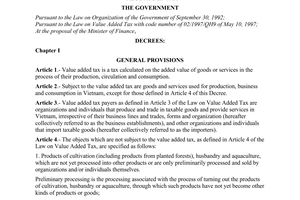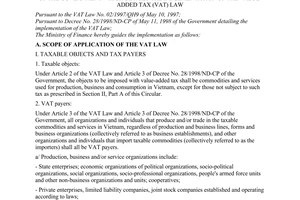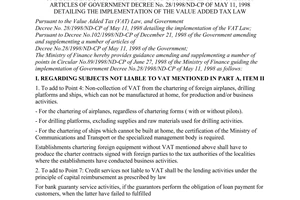Circular No. 93/1999/TT-BTC of July 28, 1999, guiding the reimbursement of value added tax đã được thay thế bởi Circular No. 122/2000/TT-BTC of December 29th, 2000, on value added tax providing guidelines for implementation of Decree 79/2000/ND-CP of the Government dated 29 December 2000 making detailed provisions for implementation of Law on Value Added Tax (VAT). và được áp dụng kể từ ngày 01/01/2001.
Nội dung toàn văn Circular No. 93/1999/TT-BTC of July 28, 1999, guiding the reimbursement of value added tax
|
THE
MINISTRY OF FINANCE |
SOCIALIST
REPUBLIC OF VIET NAM |
|
No: 93/1999/TT-BTC |
Hanoi, July 28, 1999 |
CIRCULAR
GUIDING THE REIMBURSEMENT OF VALUE ADDED TAX
The Ministry of Finance issued Circular No. 89/1998/TT-BTC of June 27, 1998; Circular No. 175/1998/TT-BTC of December 24,1998 guiding the implementation of the Government’s Decree No. 28/1998/ND-CP of May 11, 1998 and Decree No. 102/1998/ND-CP of December 21, 1998 detailing the implementation of the VAT Law; and Decision No. 1632/1998/QD-BTC of November 17, 1998 promulgating the regulation on the establishment, management and use of the VAT reimbursement fund. In order to reimburse VAT promptly and according to schedule, the Ministry of Finance guides some specific matters on VAT reimbursement as follows:
I. ON SUBJECTS ELIGIBLE FOR VAT REIMBURSEMENT:
1. Subjects eligible for VAT reimbursement:
Business establishments which pay tax by deduction method shall be considered for VAT reimbursement in the following cases:
a) Business establishments for 3 consecutive months have the deductible input tax amount larger than the output tax amount. The deductible input tax amount includes the input tax amount arising in the month and the deductible input tax amount carried forward from the preceding month.
Example: Company B has the amount of declared VAT as follows:
(Unit: million VN dong)
|
Time |
Input tax |
Output tax |
Difference |
Payable tax (progressive) |
|
February |
600 |
100 |
- 500 |
- 500 |
|
March |
100 |
200 |
+ 100 |
- 400 |
|
April |
150 |
200 |
+ 50 |
- 350 |
According to the above example, company B is the subject entitled to the consideration for tax reimbursement. The reimbursed tax amount for the 3 months is 350 million VN dong.
b) Business establishments dealing in export goods, which have large amounts of reimbursed input VAT due to the exportation of seasonal goods items and/or goods in big shipments with great value and/or great quantity, shall be considered for tax reimbursement according to each month or each goods shipment. A large reimbursed tax amount is determined as from 300 million VN dong upwards.
c) Establishments producing and/or dealing in goods and/or services liable to VAT, which procured fixed assets for new investment or extensive/intensive investment; the reimbursement of input VAT on newly procured fixed assets shall comply with provisions in Points a and b, Clause 2, Article 15 in the Government’s Decree No. 28/1998/ND-CP.
d) Besides the above-mentioned subjects, the business establishments, which, when making final tax settlement upon their merger, splitting up, dissolution or bankruptcy, have the overpaid VAT amount, shall be entitled to the tax reimbursement if they so request; as shall be business establishments which have got decisions on tax reimbursement from competent bodies (for these cases, regardless of whether the business establishments pay VAT by tax deduction method or by direct calculation on added value).
2. Subjects eligible for VAT reimbursement shall have to:
a) Compile dossiers requesting tax reimbursement and file them to the tax authorities. The tax reimbursement dossier is defined for each case according to Point I - Part D in Circular No. 89/1998/TT-BTC of June 27, 1998 of the Ministry of Finance.
b) In cases where the dossiers are unclear or incomplete and the tax authorities request the establishments to make supplements or clarification, the establishments requesting tax reimbursement shall have to supply supplementary dossiers or make clarification at the tax authorities’ request.
c) Enterprises requesting the tax reimbursement shall be responsible for the accuracy of declared figures related to the determination of the amount of reimbursed tax. All cases of errors, when detected through inspection, shall be dealt with by retrospective collection of tax. Depending on the cause and seriousness of the violations, the violator shall also be subject to a fine or the examination for penal liability according to law.
II. TAX AUTHORITIES’ AND THE STATE TREASURY’S COMPETENCE AND RESPONSIBILITIES IN THE SETTLEMENT OF VAT REIMBURSEMENT:
1. Competence to settle the tax reimbursement:
a) The Directors of the provincial/municipal Departments of Tax shall consider and issue decisions on VAT reimbursement to eligible subjects directly managed by the Departments and Sub-Departments of Tax.
b) The General Director of Tax shall consider and issue decisions to reimburse tax to special subjects under the authorization of the Minister of Finance and Corporations established by the Prime Minister’s Decision No. 90/TTg of March 7, 1994 and Decision No. 91/TTg of March 7, 1994 (called Corporations 90, 91 for short), if the tax reimbursement is concentrated at the offices of Corporations.
2. Responsibilities of the tax authorities in tax reimbursement:
a) To receive the tax reimbursement dossiers from tax payers. The dossiers receiving section shall inscribe clearly the date of receiving and promptly hand them to the examination and treatment section.
b) To check the dossiers, and determine the amount of tax to be reimbursed:
- The dossiers examination section shall have to check: the general declaration of the output VAT amount, the arising input VAT amount to be deducted, the export contracts, the export goods processing contracts signed with foreign parties, the export goods declarations with certification of the actually exported goods volume by the bordergate Customs authorities.
- To check the tax amount requested for reimbursement; compare list of purchase receipts and sale invoices, the output tax, the deductible input tax... with the business situation, tax collection and payment in the previous month, thereby determining the actual amount of tax to be reimbursed so as to fill the procedures for tax reimbursement to enterprises.
In cases where the dossiers are found incomplete, the tax authorities shall request the enterprises to supplement them; if declarations are found unclear or untrue, the tax authorities may exchange ideas with the enterprises for clarification and confirmation. In specific cases, they can request enterprises to explain or add the evidencing dossiers (not the examination).
The tax authorities shall have to consider dossiers and settle the tax reimbursement for enterprises within 15 days after receiving the dossiers requesting the tax reimbursement from the enterprises. In cases where the dossiers examination, verification and supplement are required... the maximum time limit is 30 days. If the procedures and conditions for tax reimbursement are not met, the reply must be given to the enterprises within 7 days after receiving the dossiers.
c) To make decisions on tax reimbursement:
After checking, if the procedures are completed and conditions are met as defined in Point I - Part D of Circular No. 89/1998/TT-BTC of June 27, 1998 of the Ministry of Finance, to determine and submit the tax amounts to be reimbursed to the Directors of Tax Departments for issuing decisions to refund tax to the tax payers as prescribed by law.
After the tax is refunded, the tax authorities may decide the examination or inspection at the establishment if there is suspicion about the case or a need to organize the re-examination or reinspection to determine accurately the amount of reimbursed tax.
3. Responsibilities of the State Treasury:
When receiving VAT reimbursement decisions and spending authorization from the tax authorities, the provincial/municipal State Treasuries shall make the expenditures on the VAT reimbursements to the subjects within 3 days after receiving the dossiers of spending on tax reimbursement. Simultaneously, provincial/municipal State Treasuries shall have to immediately fill the procedures for settlement with VAT reimbursement fund opened at the Central State Treasury.
III. ORGANIZATION OF IMPLEMENTATION
In order that the VAT is reimbursed in accordance with law, the provincial/municipal People’s Committees are requested to actively direct the tax authorities to make the timely and accurate VAT reimbursement to the right subjects. At the same time, branches are requested to co-ordinate with the tax authorities in inspecting and guiding the tax payers in the strict observance of the regimes on accounting, statistics, invoices, vouchers; to fully and accurately declare the payable tax amount as well as the tax amount to be reimbursed at their requests.
This Circular takes effect 15 days after its signing. All previous regulations on VAT reimbursement contrary to the provisions of this Circular are annulled. In the course of implementation, if any problems regarding the settlement of tax reimbursement arise, tax-payers, branches and/or localities are requested to promptly report them to the Ministry of Finance for study and settlement.
|
|
FOR THE MINISTER OF FINANCE |



